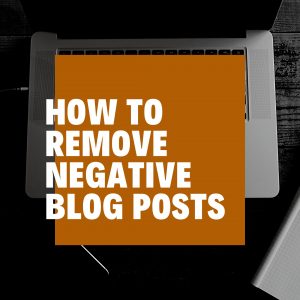Table Of Content
How to get a negative blog post about you removed from the internet
Web logs, commonly referred to as “blogs,” have been around online for years. Many people use them as an outlet for their personal voice, a resource for building and promoting their business, or as an engagement center with the greater community. Blogging is a popular pastime and blogs are everywhere, on every topic.
Sometimes, however, that topic can be you—and the contents aren’t always good. People also use blogs to attack and slander other people or companies online. These posts are simple to put on the internet, and are fairly difficult to remove, especially due to the “sticky” nature of search engines and the Internet. More often than not, negative content and attack posts are put online purposefully, with the full intention of turning search engines against someone.
By understanding various blogging platforms on which false and reputation-damaging posts occur, how these blogs work, and who operates them, you can form a well-rounded strategy for combating the negative blog post content on search engine results and disassociate yourself with any defamatory information online.


We Can Help!
Defamation Defenders is a online reputation repair and profile defending firm based in Boulder, Colorado. Our team has helped 1000s remove tens of thousands of links from internet search engines and we can help you too
Contact us today for a free consultation with one of our experienced online reputation defenders!

Popular Blogging Platforms
There are a wide variety of blog platforms people use to share their opinions and their lives. Knowing how these blogging sites work is key to understanding how to remove posts from the platforms, and from the internet completely.
Blogspot
Blogspot, also known as “Blogger,” is a popular platform that started as an independent service, but was later purchased by Google. Google now maintains Blogspot as one of the most widely-used blog services on the internet. Blogspot users love the ease of use, connectivity with other Google products and services, and the ease to which content can be published and shared across the web.
Many Blogspot accounts are personal, but businesses use them as valuable resources to supplement their business, and professional bloggers use the platform to earn money through advertising options.
Learn more about how to remove negative content from Blogspot blogs here.
Tumblr
Under Yahoo ownership, Tumblr.com is a social blogging platform that combines the ease of sharing and deeply-ingrained interactivity of Twitter with a full-service blogging platform. Tumblr users tend to be younger, trendier, and more web-savvy. Dealing with negative information on Tumblr can be more difficult than other blogging platforms due to the “Reblogging” feature, which lets other users copy content from each other verbatim, thereby increasing the number of other internet users that see it, and the perceived validity of any falsified or libelous claims.
WordPress
WordPress is an incredibly powerful blogging platform with a service running on the front end of their own website, as well as a powerful software suite that professional web developers love using on private hosting plans. WordPress blogs can benefit in search results from being hosted on WordPress, and they can also be hosted on a private domain easily. Blogging and web publishing enthusiasts love WordPress for its backend features and wealth of plugins.
Precedent Protecting Blog Content from Legal Removal
As social media and online content sharing continues to evolve, so too will the implications of falsified claims and defamatory content posted online, and the necessity of shielding your internet reputation to to protect against it.

One of the most interesting legal cases involving blogging and libelous content has to be the case of a pediatrician in Boston, and his controversial behavior outside of court.
Under the protection of an anonymous pseudonym, a pediatrician made lewd comments and derogatory remarks outside of court during a malpractice case he was directly involved in. Once the plaintiff’s legal team found his blog, they were able to pin the posts on him, and he settled out of court before the evidence could be used against him.
Blog posts are subject to Free Speech rights, although the topic is still being argued in courts nationwide today. In recent years in fact, the Senate has held hearings to determine whether or not protections against purposefully harassing speech should be protected more broadly, which would include public blog posts. Social media actions, like “Likes” and shares are also being argued as expressions of speech.
Strategies to Deal with a False Blog Post About You
While the legal system decides where exactly blog posts and social media content lies in the political spectrum, you have the right to protect yourself from reputation-damaging blog content. This can potentially be difficult, however, unless you know what you’re doing.
The best place to start is to simply ask the author to remove the post. If they agree, the hard work is done, quickly and simply. If they refuse, there are still ways to remove negative content from the internet. Webmasters and administrators can be contacted and asked to remove content on the grounds that it is purposefully libelous and attacking in nature.
Blocks and de-listing requests can also be submitted to search engines like Google to remove the content from search engines. Other technical solutions include creating a portfolio of positive online content to counteract the negative content, and develop SEO content across other websites that replaces the old, problematic content with new, positive content on the Search Engine Results Page (SERP) when your name is searched on Google, Bing or DuckDuckGo.
Online reputation management is a difficult task, but when you know what you’re up against, and you have a grasp on basic online reputation repair strategies to remove blog posts or bury the links on internet search results, it can be a simple and effective tool to defend your reputation and reinstate your good name on Google and the internet.
